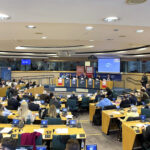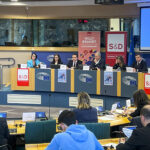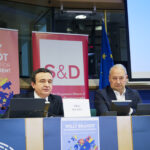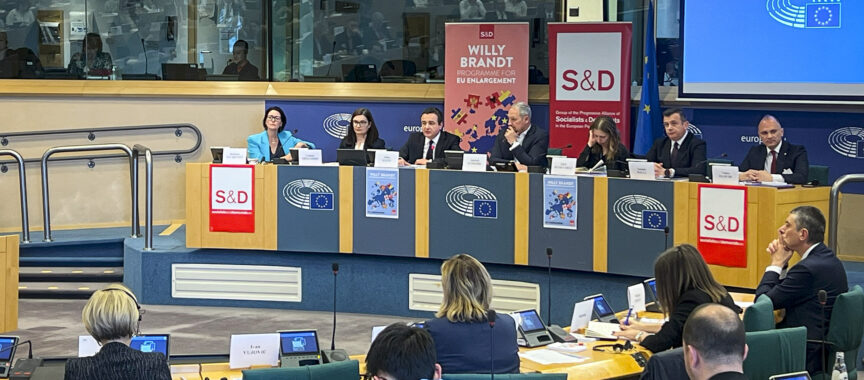Brussels, 7 April 2025
Following the discussion organized by the Centre for European Policy Studies (CEPS) today, in cooperation with the Embassy of the Republic of Kosovo in Brussels, the Prime Minister of the Republic of Kosovo, Albin Kurti, was the keynote speaker at the panel discussion organized by the Progressive Alliance of Socialists and Democrats (S&D) Group in the European Parliament on the topic “Practical support for preparations for EU membership” on the occasion of the launch of the Willy Brandt Programme of EU Enlargement.
Full speech in English by Prime Minister Kurti:
Dear comrades,
Kathleen Van Brempt,
Dear Andreas Schieder and Tonino Picula, and other MEPs attending this event,
Dear friends, fellow progressives, honored guests,
It is my pleasure to address you at a gathering that carries the name of one of Europe’s greatest social democrats, Willy Brandt. A man who devoted himself to freedom, peace, and democracy, and who understood, profoundly, that peace is not merely the absence of war, but the presence of justice.
As he stood before the Warsaw Ghetto Memorial and knelt, Willy Brandt did not speak, yet his silence echoed louder than any speech. He reminded the world that reconciliation is built not on forgetting or denying, but on accepting responsibility.
Today, in the face of renewed threats to democracy and peace and to European unity, it is not enough to simply admire Willy Brandt’s legacy, we must rise to it.
As social democrats, we share the belief that politics must serve the people, not the powerful. That economy must work for everyone, not just for the wealthy and that democracy must be defended, not just during crisis.
It is no exaggeration to say that democracy today is under attack. From the rise of the far right in our parliaments to the spread of disinformation in our societies, from oligarchs’ ownership of the media to the corruption that undermines trust in our institutions, the threats we face are present and they are real.
This means that all of us have a responsibility to stand up and do our part. As Karl Popper warned us, “The enemy of open society is not just the tyrant, but those who look the other way.” We must not look the other way.
The European Union was never meant to be just an economic project. It was, first and foremost, a project built on the rejection of fascism that tore our continent apart. An idea laid out by Schuman and Monnet, and perfected by leaders like Willy Brandt, who understood that Europe would only survive if it worked together with solidarity based on shared values of democracy, human dignity, and civil rights. They understood that conflict could be avoided by working together through common institutions.
Thus, at a time when Europe was still cleaning up the rubble left by World War II, when pain and suffering were great, and hatred and mistrust were still prevalent, those leaders gave us the European Coal and Steel Community (ECSC), which laid the foundations for a peaceful and united Europe.
Today, this legacy, the European Union, which has brought the longest peace Europe has ever witnessed, is under attack by some leaders who claim the European Union is a threat to their sovereignty, when, in fact, it is the greatest protector of it. These leaders are weaponizing economic fears to turn workers against migrants and citizens against each other.
In an era where information is easily manipulated through fake news, deepfakes, and disinformation campaigns designed to sow doubt in democracy, they can succeed, unless we, as progressives, take a stand.
Because we’ve seen this movie before, and we know how it ends.
To be frank, those in Europe who attack the European Union on the grounds that it undermines state sovereignty, whether intentionally or not, are catering to Russia and those who seek to divide the European Union. No European state today possesses the strength to stand alone against the great powers of the world. So, when and if we fail to stand together, we will forfeit our collective influence and security.
The European Union must be defended, for it is indispensable to our shared future.
The future of my country, Republic of Kosova and all other countries in Europe is linked with the future of Europe, and the future of Europe is linked with the success of the European Union.
Europe’s commitments to its fundamental values and principles are also being tested in the Western Balkans.
For decades, our region has been promised a European future within the European Union, yet that future has not materialized. The merit-based process focused on EU fundamental values gave way to maintaining stability and the status quo. This approach favored strong leaders over strong values, leaders who, instead of committing to reforms, focused on strengthening their grip on power.
Of course, it is the citizens of the Western Balkans who are paying the price for such policies. But if these policies are not adjusted, it will be Europe that ultimately pays the price.
History has shown us that our fates are interlinked. A conflict in one corner of Europe threatens our collective security, and again the Western Balkans are surrounded by the borders of the European Union. We are not European Union’s neighbors; we are European Union’s front yard.
There is no better example of the EU’s test than my country, Kosova.
Kosova is a success story. From a society devastated by war, we have built a country that is one of the fastest-growing economies in the region, and we are becoming one of the most vibrant democracies in Europe.
In the last four years, we have improved by 31 places in the fight against corruption according to Transparency International. We’ve seen the fastest rise in rule-of-law indicators, according to the World Justice Project, and improved liberal and electoral democracy and global freedoms according to Freedom House and V-Dem Institute.
We had an average economic growth rate of 6% and for the first time since independence, we have completed a full electoral mandate of four years. For us progressives, economic growth means social well-being. Growth is not supposed to held back for the state, but should be distributed in the society and create equal opportunities for all. Every 8th euro of our growing economy which was achieved despite multiple crisis, was re-distributed to those most vulnerable who were struggling with the economic crisis – citizens and small businesses. This made us the government with the biggest support package in the region (relative to GDP), as confirmed by the World Bank. And we have moved from being a recipient of World Bank aid to becoming a donor.
We introduced for the first time allowances for new mothers and children, increased pensions by 20% and more than doubled the minimal wage. All this was done without changing fiscal policy and all the while maintaining the lowest public debt in Europe (16.52% of GDP), so that we do not develop or grow at the expense of future generations.
Kosova is doing its homework when it comes to enlargement. Besides advancing democracy and growing our economy, we are among top performers when it comes to integration in the European Union. Over the past four years, we have successfully addressed numerous long-delayed reforms related to the EU acquis, which have been consistently recommended by the EU for a decade now. In the latest Progress report, we scored progress in 36 areas, only in 2 areas there was no progress and without any areas with regress.
We are the most pro-active member of the Berlin Process and regional economic cooperation. We were the first country to deliver in time the EU Reform Agenda for the Growth Plan for the Western Balkans and we are among the first to adopt all Berlin Process Agreements in our parliament.
Everyone recognizes Kosova’s impressive progress, yet our application for EU membership has been left to gather dust for 27 months since we applied. Likewise, our application for the Council of Europe is met with resistance and additional criteria that no other country in Europe has been subjected to in their membership process.
Meanwhile, within EU we still have five member states that refuse to recognize Kosova as a sovereign state.
This weakens the strength of the European Union and Europe itself. Instead of working together to tackle global challenges such as inequality, climate change and rising authoritarianism, we are forced to look inward.
It was in the chambers of the European Union that, one day after Kosova declared independence, the 27 members of the EU, including today’s five non-recognizer’s, in the format of ministers of Foreign Affairs, issued joint conclusions, stating: “The Council reiterates the EU’s adherence to the principles of the UN Charter and the Helsinki Final Act, inter alia the principles of sovereignty and territorial integrity and all UN Security Council resolutions. It underlines its conviction that in view of the conflict of the 1990s and the extended period of international administration under Security Council resolutions 1244, Kosovo constitutes a sui generis case which does not call into question these principles and resolutions.”
Two years later, the highest court in the world, the International Court of Justice, issued an opinion on our Declaration of Independence, which concluded by ten votes to four that the court “Is of the opinion that the declaration of independence of Kosovo adopted on 17 February 2008 did not violate international law.”
The five remaining EU countries must recognize Kosova, not just because it is the right thing to do, but because a divided European Union on such a fundamental issue withers the EU itself and erodes its foreign policy.
A weakened Europe emboldens those who wish to see it fail, autocrats who believe democracy is negotiable. Indeed, recognizing Kosova is not only the right thing to do; it is important for the EU’s strength, unity, and credibility on the global stage.
Europe again must be defended, politically and militarily. Putin’s war on Ukraine is not just an attack on Ukraine; it is an attack on all of us. We must unite and do more. We must invest in our defense, not because we want war, but because we need peace. As Willy Brandt once said, “Peace is not everything, but without peace, everything is nothing.”
That is why Europe must not hesitate to strengthen its security and why NATO must remain the cornerstone of our collective defense. We have already met NATO’s threshold of 2% of GDP spending on defense, but we recognize that we must do more as part of our collective responsibility, and we will, because we cannot allow autocrats, whether in Moscow or Belgrade to determine the future of our continent.
And, being here among social progressives, where critique is the drive of progress, I want to end my speech in a rather critical note. In these four years of my mandate, I’ve observed a disheartening pattern. Our efforts to advance democracy, the rule of law, and the EU fundamental values are increasingly acknowledged in words—but too rarely supported in action. In other words, our policies have been more liked than supported, while our northern neighbor’s policies have been less liked but more supported.
Our northern neighbor, who is aggressive and provokes tension, and seeks destabilization, today harbors and protects a terrorist, yet it is Kosova that remains under the European Union’s restrictive measures. If we were in the 2000s, such a situation would have been unacceptable to any democratic government. And yet today, it is tolerated sometimes even rationalized here in Brussels, where our northern neighbor’s simultaneous alignment with both Moscow and Brussels is viewed as a strategic balancing act, rather than what it truly is: an affront to EU values and a reflection of failed policy towards Serbia.
This is not simply an inconsistency; it is a challenge to the credibility and reputation of the European project. If Brussels is to still be a guardian of Europe’s founding principles, then its support must go to those who uphold them, not to those who compromise them.
And yet, I remain confident that a Europe that aligns its values with its decisions is not only possible, but also necessary now more than ever. Clarity and firmness will make the EU enlargement process stronger, fairer, and ultimately, more enduring.
Kosovo stands ready to be part of that future.
In the end I would like to express my gratitude for the commitment of the Foundation for European Progressive Studies together with the partners Friedrich Ebert, Max van der Stoel and Olof Palme. I would like to extend my thanks for FEPS, all its abovementioned partners and other like the Foundation Jean Jaurès from France, for their joint leadership in conducting the social democratic network Friends of the Western Balkans, from which I have very fond memories of our meeting a year ago in Prishtina.
Thank you very much.
Last modified: April 8, 2025



